#Alexander III of Macedon
Explore tagged Tumblr posts
Text

115 notes
·
View notes
Text

Marble bust of Alexander the Great.
(Ny Carlsberg Glyptotek, Copenhagen)
#alexander the great#ancient greece#macedon#history#ancient art#classical#classical greece#macedonia#marble#marble statue#marble bust#alexander iii#alexander iii of macedon#copenhagen#ny carlsberg glyptotek#museum
20 notes
·
View notes
Text
Alexander : How’re you feeling?
Hephaestion : Not good. I have this headache that comes and goes.
Stateira, walks into the room : ...
Hephaestion : There it is.
#alexander the great#alexander the making of a god#alexander iii of macedon#hephaestion#alexander x hephaestion#Stateira#incorrect quotes#hephaestion is so jealous#we read him like an open book
45 notes
·
View notes
Text
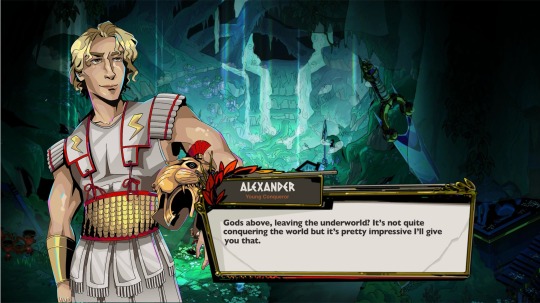
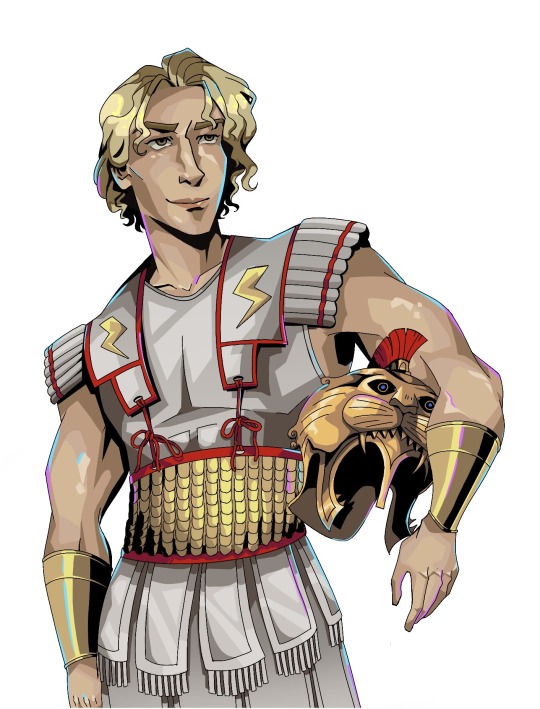
Oh Alexander, you silly goose.
#hades#hades game#hades supergiant#hades fanart#hades video game#alexander the great#alexander iii of macedon#greek mythology#tagamemnon#classics#rip to the worlds hardest partier#you would’ve loved party rock anthem by LMFAO
44 notes
·
View notes
Text

Classic Alex
#historical memes#history#history memes#meme#memes#historical#ancient history#Ancient Greece#ancient Persia#Alexander#alexander the great#alexander iii of macedon#macedon#macedonia#alexander of macedon#gordian knot
25 notes
·
View notes
Text






#alessandro magno#alessandro iii di macedonia#alexander the great#alessandro il grande#alessandro il macedone#alexander the conqueror#alessandro il conquistatore#alexander iii of macedon#alexander of macedon#Alexander den store#aleksanteri suuri#aleksander wielki#aleksander macedonski#Karol bunsch#Wydawnictwo sbm
9 notes
·
View notes
Text
Coin of the Day #65 (7/8/2024)
A Roman provincial with Alexander the Great instead of the emperor?


Roman Province - Macedonia
AE27 - 13.76g
Semi-Autonomous under Gordian III (238-244 AD)
Koinon of Macedonia
Obverse ΑΛΕΞΑΝΔΡΟΥ
Head of Alexander III right, diademed, with long flowing hair
Reverse ΚΟΙΝΟΝ ΜΑΚΕΔΟΝΩΝ Β ΝΕ
Two agonistic crowns with palm fronds on agonistic table
RPC VII 178
#coin of the day#roman empire#roman province#koinon of macedonia#macedonia#Gordian III#semi-autonomous#alexander iii of macedon#Alexander III#alexander the great#ancient rome#roman coins#coin#coins#numismatics#ancient coins
7 notes
·
View notes
Text
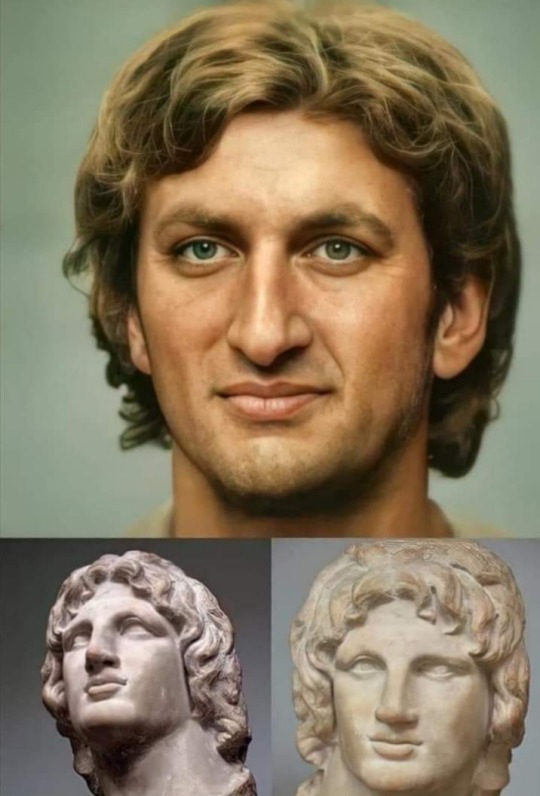
Recreating facial features of "Alexander the Macedonian" using the digital system according to the shape of his face in carved statues.
Alexander the Great died in the palace of King Nebuchadnezzar in Babylon in Iraq in 323 BC, when he was only 32 years old.
—
Alexander III of Macedon (20/21 July 356 BC – 10/11 June 323 BC), commonly known as Alexander the Great, was king of the ancient Greek kingdom of Macedon.
He succeeded his father Philip II to the throne in 336 BC at the age of 20.
He spent most of his ruling years conducting a lengthy military campaign throughout Western Asia and Egypt.
By the age of 30, he had created one of the largest empires in history, stretching from Greece to northwestern India.
He was undefeated in battle. He is widely considered to be one of history's greatest and most successful military commanders.
#Alexander the Great#Alexander III of Macedon#Alexander the Macedonian#Archaeo Histories#Macedon#Ancient Greece#Ancient Empires
50 notes
·
View notes
Text
Okay, but like, what did Alexander the 'Great' even do? The nepo baby gets an army, kills his cousin, and conquers an empire? Like, good job? But I bet your dad would have done better.
#alexander the great#ancient history#ancient greece#history#Alexander III of Macedon#philip II of Macedon
1 note
·
View note
Text
Lmao
Apama became software.
Alexander was named after Alexander the Great in nod to the Konqueror web browser and one of the codenames of Safari web browser during Safari development.


1 note
·
View note
Note
How important was it, really, that Alexander didn't have more brothers? He had Karanos, and it there's the gossip that ATG or his mother killed the boy. Philip Arridhaios apparently wasn't seen as a direct challenge and ATG kept him around. But if Philip had more healthy male offspring around Alexander's age, would that have threatened his hold on power, the partition of the empire or even the military campaigns themselves (the brothers becoming generals for example)?
Philip’s (Lack of) Sons
So, first I need to correct the bit about Karanos. He didn’t exist. Justin gave baby Europē a sex-change. No historian reports two children for Kleopatra Eurydikē, and Justin alone names a boy. We get two children when modern historians try to reconcile Justin and Diodoros/others. But Justin gets things wrong a lot. So, where Justin disagrees with other historians, I’ll go with the others (especially if it’s more than one). Justin wasn’t simply epitomizing Pompeius Trogus; he had his own agendas and themes, so he changed things when it suited him.
Therefore, “Karanos” = Europē,* born just a few days (maybe a week or two) before Philip’s murder.
The wives and children of Philip are reported in a fragment from Satyrus preserved in Athenaeus (13.557b-c). Of his (living) children, we have four girls (Kynannē, Kleopatra, Thessalonikē, and Europē), and only two boys (Arrhidaios and Alexander).
I specify living because ancient accounts don’t usually list children who died young unless it somehow impacted events. So, the murder of Europē, which led to the suicide of Kleopatra Eurydikē, means Europē got a mention whereas if she’d died of some childhood disease, we’d probably not hear about her.
Ergo, it’s possible Philip did sire other children who simply didn’t survive long enough to make it into the histories—especially if they’d been born (and died) in his earlier years. In Dancing with the Lion, I invented a son (Menelaos) by the shadowy Phila of Elimeia, who died young, specifically to illustrate that point.
The two-to-four ratio of boys to girls suggests Philip fathered girls more than boys. Would more boys have endangered Alexander’s place? Certainly, if they were around his age. But not if they were notably younger—another point I make in Dancing with the Lion: why Alexander is less upset by Philip’s seventh marriage than his mother. The chance that Kleopatra Eurydike might bear a male child threatened Olympias’s position far more than Alexander’s. Even some of my colleagues seem to forget that. While yes, sons and mothers did form a political unit at polygamous courts, that doesn’t mean that threats to the mother’s status necessarily entailed threats to a son’s. Philip’s marriage to Kleopatra Eurydikē was just such a case. Any son she produced would’ve been so far behind Alexander in achievements (and thus, a shot at the throne), that the marriage was no threat—which is why he attended the wedding. That makes events at the wedding very curious indeed! And convinces me that we don’t even begin to have the whole story there.
I made up some things in Rise (no spoilers), precisely because we don’t know and I had to come up with something that didn’t make Alexander into a reactionary rube. Too often people point to him as a “hotheaded youth” who made a mountain out of a molehill at his mother’s instigation. Folks, he was eighteen or nineteen. Hotheaded (always), but not some little kid to jump at shadows and Mommy’s tales. Something truly threatening generated that level of reaction from him (and beyond what Diodoros relates at the wedding). It wasn’t fear of being replaced by an as-yet-not-even-conceived infant brother--unless Philip had other reasons to replace him, and there weren’t any … on the face of it.
Anyway, I want to end by pointing to the Big Pink Elephant in the room that way too many people seem to forget….
AMYNTAS PERDIKKA was Alexander’s chief rival, not Arrhidaios or a fictional infant brother. Amyntas was older than Alexander, the only son of Philip’s older brother Perdikkas (III), who’d been king before Philip. Amyntas didn’t become king when his father died in battle precisely because he was only about a year old, while Philip was c. 23/24, and the kingdom was in crisis. Being a baby was also why Philip didn’t kill him. He needed an heir until he could father his own.**
So despite being the eldest Argead after Philip and the legitimate son of a former king, Amyntas spent his life as “the spare.” Imagine the resentment that would have generated. It’s not an accident that Alexander had him killed inside six months of taking the throne. And it’s probably in that time frame that Amyntas would’ve staged a bid for the throne himself. After all, not only was he an Argead, with military experience, he was married to Philip’s eldest child, who was already pregnant, showing he was fertile. He had a really good claim.
Such a clearing out of competing Argeads was standard for any new king’s first year or so. It’s what whittled down available Argead males from the five sons (and progeny) of Alexandros I to just three at Philip’s death, a hundred years later: Amyntas, Alexander, and Arrhidaios. Alexander wasn’t unique in house-cleaning. Philip had killed his three half-brothers upon taking the throne, keeping only Amyntas, his nephew. This was so typical it’s of note that Alexandros II not only didn’t get rid of Perdikkas (III) or Philip (II), but kept around his half-brothers too. It was the exception, not the rule (perhaps because all of them were still too young to be a threat?).
So basically, given Argead patterns, the survival of male siblings/cousins depended on a couple things:
The age of the sibling(s)/cousins. Siblings and half-siblings who were notably younger were likely to be spared if they didn’t appear to offer an immediate threat. After all, the new king needed an heir until he could father his own.
The apparent competence of the sibling(s)/cousins. Arrhidaios is our best evidence for this: Alexander took him with him to Asia to keep an eye on him—prevent his use as a stooge in a coup—but he otherwise kept him alive.
The king’s personal relationship with the sibling(s)/cousins. This is obviously very hard to determine, as our sources may not tell us, or not tell us honestly, but even if it’s hard, that doesn’t mean we should neglect it as a possible motivating factor. It may, in fact, explain why Alexander II (Philip’s older brother) didn’t kill his siblings. He may have loved them (and them, him). While we can’t say from the evidence, we also shouldn’t dismiss that as a possible motivating factor.
Here's an earlier posts about Amyntas, btw.
AMYNTAS PERDIKKA
* The names themselves are a give-away. “Europē,” like “Thessalonikē” was bestowed in celebration of Philip’s military victories. By contrast, “Karanos” (which means generic “chief”) isn’t a royal Macedonian name at all. Bill Greenwalt talks about the name’s significance in one of his articles, but I can’t now recall which.
** There is some question as to whether Amyntas was ever king, however briefly, due to a reference to an “Amyntas IV.” But many of us believe that was part of a challenge to Alexander later, not proof that Amyntas was king briefly, and Philip his regent.
#asks#Philip II of Macedon#Philip of Macedon#Alexander the Great#Arrhidaios#Perdikkas III of Macedon#Alexander II of Macedon#Amyntas Perdikka#ancient macedonia#Argead Macedonia#Inheritance in Argead Macedonia#Karanos#Justin lies
26 notes
·
View notes
Text
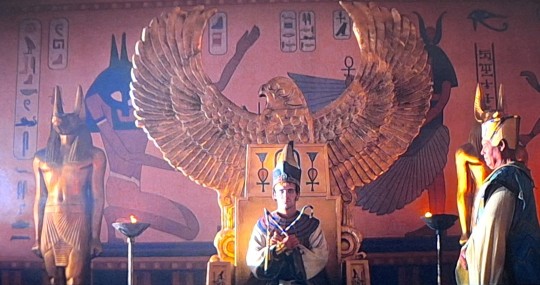
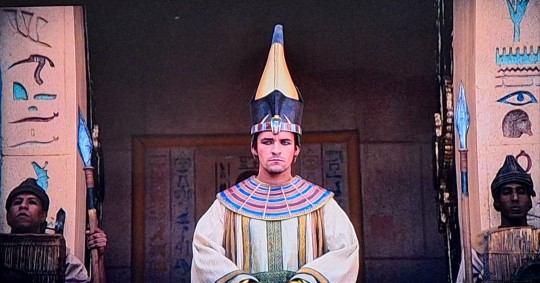

"What Alexander the Great accomplishes, seems like something out of myth....and yet he did it."
#alexander the great#alexander iii#alexander: the making of a god#ancient egypt#ancient greece#macedonia#alexander of macedon#bruck Braithwaite#loooove it#a+ example of how the ptolemaic dynasty would do it right after him too#they would have looked very similar
84 notes
·
View notes
Text

okay sid meier’s civilization twitter account, you win this one
(IMAGE ID: a screenshot of the Sid Meier’s Civilization Twitter account. It displays six different images of Alexander the Great from six different Civilization games which look drastically different, ranging from lionlike leader to rat-faced little bitch to alpha chin man to blonde guy I guess to that dude that’s on the cover of every paperback romance to discarded Shrek human design. The account has captioned these images “Did you do something with your hair, Alexander?”)
#guess my guy put all his scientist on discovering plastic surgery as soon as possible#what did they do to you#civilization#sid meier's civilization#civ 1#civ 2#civ 3#civ 4#civ 5#civ 6#civ i#civ ii#civ iii#civ iv#civ v#civ vi#alexander the great#alexander of macedon
46 notes
·
View notes
Text

Nepo babies used to conquer all of Asia, now they just steal roles from actors😒.

(I'm so obsessed with him help)

6 notes
·
View notes
Text

Parmenion a D1 hater
#historical memes#history memes#history#meme#memes#historical#ancient history#ancient greece#alexander of macedon#macedon#parmenion#alexander iii of macedon
4 notes
·
View notes
Text

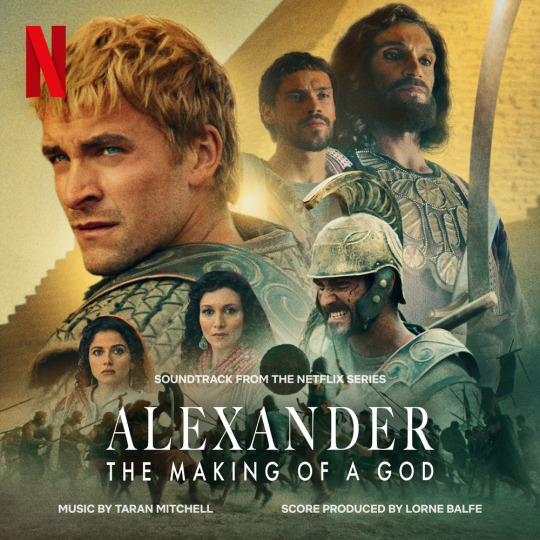
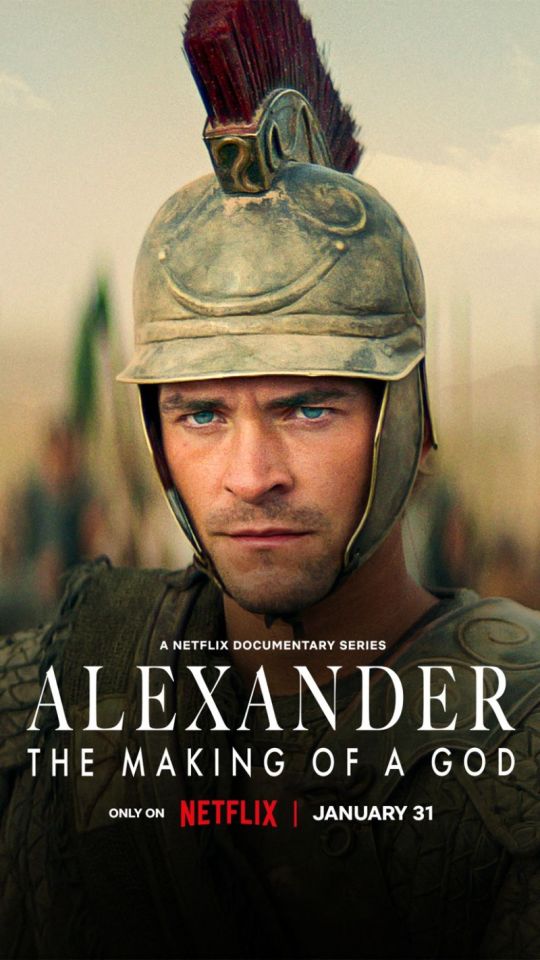

#Netflix#Alexander The Making of a God#alessandro magno#alessandro iii di macedonia#alexander the great#alessandro il grande#alessandro il macedone#alexander the conqueror#alessandro il conquistatore#alexander iii of macedon#alexander of macedon#prossime uscite#Documentary#Alessandro magno come nasce una leggenda#Taran Mitchell
24 notes
·
View notes